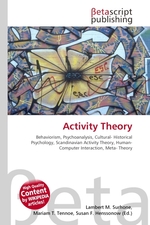Activity Theory
Lambert M. Surhone, Miriam T. Timpledon, Susan F. Marseken
бумажная книга
High Quality Content by WIKIPEDIA articles! High Quality Content by WIKIPEDIA articles! Activity theory is a psychological meta-theory, paradigm, or framework, with its roots in Vygotsky's cultural-historical psychology. Its founders were Alexei N. Leont'ev (1903-1979), and Sergei Rubinshtein (1889-1960) who sought to understand human activities as complex, socially situated phenomena and go beyond paradigms of psychoanalysis and behaviorism. It became one of the major psychological approaches in the former USSR, being widely used in both theoretical and applied psychology, in areas such as education, training, ergonomics, and work psychology . Activity theory theorizes that when individuals engage and interact with their environment, production of tools results. These tools are "exteriorized" forms of mental processes, and as these mental processes are manifested in tools, they become more readily accessible and communicable to other people, thereafter becoming useful for social interaction.
Данное издание не является оригинальным. Книга печатается по технологии принт-он-деманд после получения заказа.


